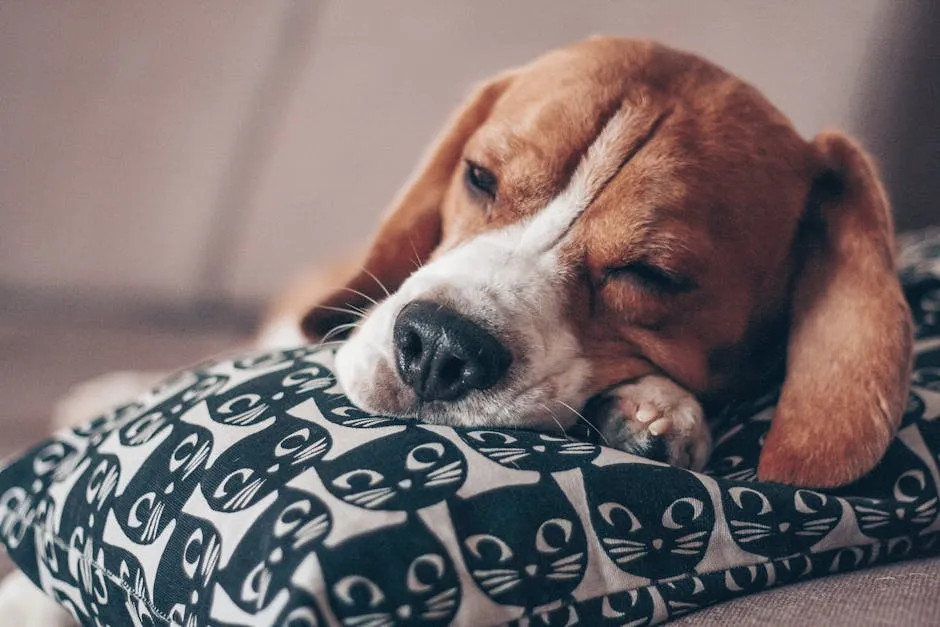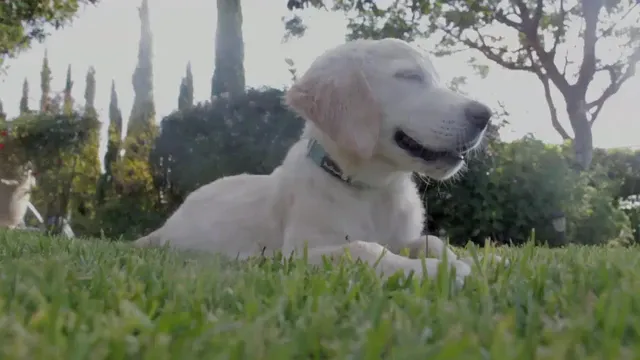
Why Do Dogs Sleep So Much? Understanding Your Furry Friend’s Sleep Habits
Introduction
Have you ever watched your dog snooze for hours and wondered why they sleep so much? You’re not alone! Many pet owners share this concern. On average, dogs sleep between 12 and 14 hours a day. Puppies and older dogs often sleep even more, sometimes up to 20 hours. Understanding your dog’s sleep habits is crucial to ensuring their health and happiness.
Speaking of comfort, if you’re looking to upgrade your dog’s sleep experience, consider the PetFusion Ultimate Dog Bed. It’s designed for maximum comfort, providing the support your pup needs for a restful sleep. Trust me, they’ll thank you for it!

How Much Sleep Do Dogs Need?
Most adult dogs sleep around 12 to 14 hours daily. Puppies and seniors, however, may require 18 to 20 hours.
Breed differences also play a role in sleep needs. Larger breeds, such as Great Danes and Mastiffs, tend to sleep more than smaller breeds like Chihuahuas. According to the American Kennel Club, many dogs spend about 50% of their day sleeping, 30% loafing, and only 20% being active.
It’s essential to monitor your dog’s sleep patterns to ensure they align with these averages. If your dog sleeps significantly more than expected, consulting a veterinarian may be a good idea. Also, consider using Dog Training Pads to help manage any accidents while they adjust to their sleep schedule.

Factors Influencing Sleep Duration
Age
Puppies and older dogs need more sleep. Puppies grow rapidly, requiring 18 to 20 hours daily. Their bodies use sleep to support growth and energy recovery. Conversely, senior dogs tire more easily and also need extra rest. Their sleep helps them recuperate from daily activities.
Breed
Certain breeds tend to sleep longer than others. Larger dogs, like Mastiffs and Newfoundlands, often sleep more than smaller breeds. Working dogs, such as Border Collies, may sleep less due to their high activity levels. Each breed’s energy requirements influence their sleep patterns.
Health
Health issues can significantly impact a dog’s sleep. Dogs recovering from illness or surgery typically need more rest. Conditions like diabetes or hypothyroidism may also cause increased sleepiness. If you notice changes in your dog’s sleep habits, consult your veterinarian. It’s also a good idea to have a Dog First Aid Kit on hand for any emergencies!

Activity Level
A dog’s activity level directly affects their sleep needs. Active dogs, engaging in regular exercise, often sleep less. In contrast, less active dogs may indulge in longer sleep periods. Keeping your dog mentally and physically stimulated promotes a balanced sleep schedule. A great way to achieve this is with the Outward Hound Hide-A-Squirrel Puzzle Toy, which keeps their minds sharp and engaged!
When to Worry About Your Dog’s Sleep Habits
Most dogs sleep a lot, but what if that changes? If your dog suddenly sleeps more or less, it might be a sign of a health issue. Keep an eye out for specific signs:
- Sudden Sleep Changes: If your dog shifts from their usual sleep pattern, take note. A sudden increase or decrease in sleep can indicate a problem.
- Lethargy While Awake: If your dog appears tired or uninterested when awake, this can be concerning. It might suggest they aren’t getting quality rest or are facing health issues.
Certain health conditions can lead to increased sleep. For example, diabetes can cause fatigue. Dogs with depression might also sleep excessively. Hypothyroidism is another condition that can lead to lethargy and sleepiness. If you observe any of these signs, consult your veterinarian. Early intervention can make a significant difference in your dog’s health.

To help manage your dog’s anxiety, consider using a Dog Anxiety Relief ThunderShirt. It’s a great tool for helping your furry friend feel secure, especially during stressful times.
Creating a Healthy Sleep Environment for Your Dog
Providing a comfortable sleep environment is crucial for your dog’s well-being. Here are some tips to enhance their sleeping conditions:
- Comfortable Bed: Invest in a high-quality dog bed. A cozy, supportive bed can make a world of difference. It should be the right size for your dog, allowing them to stretch out comfortably. The Furhaven Orthopedic Dog Bed is an excellent choice for providing that much-needed support!
- Quiet Space: Choose a quiet area for your dog to sleep. Minimize noise and distractions to help them relax. This space should feel safe and secure, away from foot traffic.
- Establish a Routine: Dogs thrive on routine. Set consistent feeding and bathroom break times. This predictability helps them feel secure and can lead to better sleep patterns.
- Regular Exercise: Daily walks and playtime are vital. Exercise helps expend energy, making it easier for your dog to sleep well. A tired dog is a happy dog!
- Mental Stimulation: Keep your dog mentally engaged. Puzzle toys, training sessions, or new tricks can help reduce boredom. Mental exercise can prevent excessive sleeping due to lack of stimulation.

By creating a supportive sleep environment and keeping your dog active, you can ensure they enjoy restful sleep and stay healthy. And don’t forget hydration! A PetSafe Drinkwell Platinum Pet Fountain can encourage your dog to drink more water, which is vital for their health!
Conclusion
In summary, dogs sleep a lot for various reasons. Their age, breed, activity level, and health significantly influence their sleep patterns. Puppies and seniors typically require more sleep than adult dogs. Understanding these habits is vital for their well-being.
It’s crucial to monitor your dog’s sleep habits. If you notice any sudden changes, like sleeping much more or less than usual, consult your veterinarian. Changes could indicate underlying health concerns that need attention.

Embrace your dog’s need for rest. Quality sleep is essential for their recovery, energy conservation, and overall health. By respecting their sleep needs, you’ll contribute to their happiness and well-being. And while we’re at it, why not treat your dog with some delicious Blue Buffalo Life Protection Formula Adult Dog Food? It’s nutritious and perfect for keeping your pup healthy and happy!
FAQs
Is it normal for my dog to sleep all day?
Yes, it is completely normal for dogs to sleep a lot. On average, they sleep between 12 to 14 hours a day. Factors like age, breed, and health can influence this duration. Puppies and older dogs may sleep up to 20 hours daily.
Do dogs dream while they sleep?
Yes, dogs can dream! They experience REM sleep, where dreaming occurs. You might notice your dog twitching or making noises during this phase, suggesting they are dreaming about their daily adventures.
What should I do if my dog suddenly sleeps a lot more than usual?
If your dog suddenly sleeps more than before, it’s important to pay attention. This change could signal health issues like diabetes or depression. Consulting a veterinarian is the best course of action to ensure your dog’s health is monitored and any necessary treatment is provided.
How can I tell if my dog is getting enough sleep?
Wondering if your dog sleeps enough? Here are some signs to look for:
- Energy Levels: A well-rested dog is alert and energetic. If your dog is playful and engaged during awake times, that’s a good sign.
- Behavior: Watch for signs of irritability or sluggishness. A dog that seems overly tired or cranky might not be getting quality rest.
- Sleeping Patterns: Healthy dogs often have a consistent sleep schedule. If your dog sleeps and wakes at similar times daily, that’s a positive indicator.
- Physical Health: Regular sleep supports your dog’s immune system. If your dog looks healthy, has a shiny coat, and maintains a good weight, they are likely sleeping well.
- Frequency of Naps: Dogs naturally nap throughout the day. If your dog naps frequently but still engages with you and their environment, they are likely meeting their sleep needs.

If you notice sudden changes in these behaviors, it might be time to consult a veterinarian. Keeping an eye on your dog’s sleep patterns helps ensure their overall health and happiness. And remember, regular grooming is also important! Check out this Dog Grooming Kit to keep your pup looking fresh!
Can a dog’s diet affect their sleep?
Absolutely! A dog’s diet plays a crucial role in its sleep quality. Here’s how nutrition impacts your furry friend:
- Balanced Diet: Dogs need a balanced diet rich in proteins, fats, and carbohydrates. A lack of essential nutrients can lead to fatigue and excessive sleeping.
- Energy Levels: Proper nutrition fuels your dog’s energy throughout the day. Dogs that don’t receive enough calories may feel tired and lethargic.
- Weight Management: Overweight dogs often experience sleep problems. Extra weight can lead to discomfort and restless nights, impacting their overall sleep quality.
- Hydration: Ensure your dog drinks enough water daily. Dehydration can cause fatigue, making them sleep more than usual.
- Meal Timing: Feeding your dog at consistent times helps regulate their energy levels. Avoid giving large meals right before bedtime, as this can disrupt their sleep.

If you’re unsure about your dog’s diet, consider consulting your veterinarian for personalized advice. Proper nutrition is key to supporting your dog’s health, energy, and restful sleep. You might also want to try some Dog Treats Cookbook to whip up some tasty snacks for your pup!

Please let us know what you think about our content by leaving a comment down below!
Thank you for reading till here 🙂
All images from Pexels




